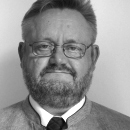
Univ.- Prof. Dr. rer. nat. habil. Harald G. Schweim
Chair of Drug Regulatory Affairs M.Sc.University of Bonn
more ...
Harald G. Schweim is pharmacist, studied food chemistry and holds the chair of Drug Regulatory Affairs at university of Bonn. Between 2011-2014 he was managing director of the pharmaceutical institute at university of Bonn. Teaching includes the master studies „Drug Regulatory Affairs“ (M.D.R.A.) and „Drug Research“ (M. Sc.) at Bonn as well as „Consumer Health Care“ (M. Sc.) at Charité Berlin and since 2011 „Master of Clinical Research and Translational Medicine“ at Leipzig.
1992 – 1995 Prof. Schweim was heading of the department “Regulatory Affairs” at “Institute for Medicinal Products” of Federal Health Agency (BGA), Berlin, 1995-2002 he was director of “German Institute for Medical Documentation and Information” (DIMDI), Köln as well as 2000 – 2004 President of “Federal Institute for Drugs and Medical Devices” (BfArM), Bonn. In 2004 he was appointed professor at university of Bonn and has been a lecturer on „Drug Regulatory Affairs“.
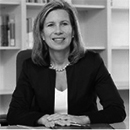
Marina Bloch
Head of Bayer Healthcare Global Anti-Counterfeiting ManagementBayer AG
more ...
Marina Bloch is lawyer innerhalb der Rechtsabteilung der Bayer AG und deren Tochtergesellschaft Bayer Intellectual Property GmbH. She is heading the Bayer Healthcare Global Anti-Counterfeiting Management and responsible for global, strategic and legal aspects of anti-counterfeiting, in particular for occurring falsified medicines.
In her previous role she was working in the trademark department at Schering AG and Microsoft GmbH. In this role she had been responsible in the fields of anti-counterfeiting as well as intellectual and industrial property rights. Mrs. Bloch has been a member of different national and international associations representing interests in combating counterfeit and intellectual properties, such as GRUR, EFPIA, APM, EAASM und IFPMA.
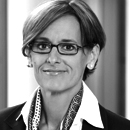
Kerstin Brixius, Ph.D.
Lawyer, Specialist Attorney for Medical LawKanzlei am Ärztehaus
more ...
Dr. Kerstin Brixius advises national and international research-based firms, generic firms, and hospitals on product- and industry-specific issues. She specializes in national and international Pharmaceutical Law and Medical Device Law, Pharmaceutical-advertising Law as well as Insurance Law of Statutory health insurances. She also advises on Clinical Examinations, Market Access, Data Protection, and Compliance.
As a former legal advisor and data protection officer of the Federal Institute for Drugs and Medical Devices (BfArM), she regularly speaks at specialist conferences and special events. Dr. Kerstin Brixius is also a lecturer at the Centre for Research in Pharmaceutical Law of the University of Marburg, and she is greatly respected as an author of specialist journals and other recognized reference works.

Dieter Mößner
Chair of the DIN Standards Committee Packaging (NAVp) at DIN e.V.Carl Edelmann GmbH and NAVp at DIN e.V.
more ...
Dieter Mößner has been working since 1997 at Carl Edelmann GmbH, Heidenheim/Brenz as team lead customer service. Edelmann manufactures folding boxes and leaflets at 13 sites globally for the Pharmaceutical and Cosmetic Industries. He was co-author of the norm „Technical guidelines Braille on packaging“, published by European Carton Makers Association (ECMA).
Since May 2006 he is Convenor of the working group CEN/TC 261/SC 5/WG 12 Marking at CEN. This committee has developed the norms DIN EN 15823 „Braille on packaging for medicinal products” and DIN EN 16679:2015 “Tamper verification features for medicinal product packaging”. The norms defines tamper verification features, which have to be applied from 2018 for prescription drugs mandatory according to directive 2011/62 EU.
In March 2013 he was assigned as chair of the DIN Standards Committee Packaging (NAVp) im Deutschen Institut für Normung (DIN) e.V.
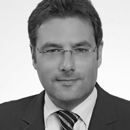
Paulo Alexandre
CEORomaco Pharmatechnik GmbH
more ...
Paulo Alexandre ist CEO der Romaco Group und Geschäftsführer der Romaco Pharmatechnik GmbH.
Er verfügt über langjährige internationale Führungserfahrung in den Branchen Automotive sowie Maschinen- und Anlagenbau. Vor seinem Eintritt in die Romaco Group 2012 war er über mehrere Jahre als Geschäftsführer in der Verpackungs- und Solarmaschinenindustrie tätig.
Nach seiner Tätigkeit bei der Kolbenschmidt Pierburg AG wechselte er als Unternehmensberater zu Horváth & Partners. 2005 wurde er Leiter Finanzen/Controlling der Oystar Holding GmbH, 2007 Geschäftsführer der IWK Verpackungstechnik GmbH. Vor seinem Wechsel zu Romaco war er Kaufmännischer Geschäftsführer der Centrotherm Thermal Solutions GmbH.
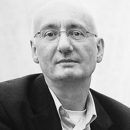
Dr. Richard Jähnke
Head of Project Office Frankfurt/MainGPHF - Global Pharma Health Fund
more ...
Aufgewachsen in Arnsberg an der Ruhr studierte Herr Jähnke zunächst Pharmazie in Bonn. Nach der Promotion auf dem Gebiet der pharmazeutischen Technologie und Verfahrenstechnik in Frankfurt am Main begann er seine berufliche Karriere bei Beecham Pharmaceuticals in London. Über weitere Stationen im Produktmanagement bei Zulieferfirmen der Pharmaindustrie wechselte Herr Jähnke vor knapp 20 Jahren zum Global Pharma Health Fund, eine gemeinnützige Initiative getragen von Merck in Darmstadt. Hier erarbeitet er gemeinsam mit staatlichen und kirchlichen Trägern technische und organisatorische Lösungen für Gesundheitsprojekte in den Entwicklungsländern.
Das Augenmerk liegt dabei hauptsächlich auf den Gebieten Arzneimittelsicherheit, Arzneimittelqualität und Arzneimittelfälschung in Entwicklungsländern. Sein Hauptwerkzeug ist dabei das GPHF-Minilab zur einfachen und preiswerten Erkennung von gefälschten Arzneimitteln, die mit den falschen Wirkstoffen, zu geringen Mengen an Wirkstoffen oder gänzlich ohne Wirkstoffe auf den Markt gebracht werden. Der Beweis gefälschter Malariamittel gänzlich ohne Wirkstoffe ging aufgrund dieser Arbeiten in die Lehrbücher zur Ausbildung von Ärzten der Fachrichtung „International Public Health“ ein.

Rainer Dahlenburg, Ph.D.
Senior Forensic ExpertFederal Criminal Police Office (BKA), Wiesbaden
more ...
Dr. Rainer Dahlenburg has been working as Senior Forensic Expert and Pharmacist for exp. Pharmacology & Toxicology, KT 34, at the Federal Criminal Police Office (BKA), Wiesbaden, Germany.
Er ist Fachpharmazeut für Toxikologische Chemie/Medizinische Toxikologie, promovierte 1986 an der EMA-Universität in Greifswald und hat ein Postgradualstudium an der ehemaligen Akademie für Ärztliche Fortbildung 1983-87 absolviert. Er ist seit mehr als 20 Jahren am Kriminaltechnischen Institut des BKA, im Fachbereich KT 34 (Toxikologie), als Sachverständiger / „Senior Forensic Expert“ tätig und nahm zuvor 11 Jahre an den Rechtsmedizinischen Instituten der Universitäten Greifswald und Halle die Leitung der toxikologisch-chemischen Abteilung wahr.
Seine Sachverständigentätigkeiten umfassen die pharmakologisch-toxikologische Begutachtung von Rauschgiften, Arznei- und Dopingmitteln und Arzneimittelfälschungen, die Sicherung illegaler RG-/Doping-/ / Arzneimittelfälschungslabore und seit 1995 die Initiierung und Gestaltung des Drug-Intelligence-Programms „CAPE“ (Counterfeits Anabolica Precusors & Ecstasy). Hr. Dr. Dahlenburg verfügt über die weltgrößte “Ecstasy”-Sammlung und berät Bundesbehörden (BMI/BMG) in BtM-Fragestellungen und Chemical Profiling Synthetischer Drogen (ATS) mit Schwerpunkt „Crystal“. Projektarbeiten und Feldstudien hatten die Schwerpunkte Stabilisotopenanalytik, mobile Felddetektionstechnik und die Konditionierung von Spürhunden.
Hr. Dr. Dahlenburg ist eingebunden in die Planung, Durchführung, Leitung diverser bilateraler/multinationaler Projekte für/mit EU, UNODC und OSCE (u. a. Polen, Rumänien, Slowenien, Türkei, Georgien, Panama, Zentralasien, Afghanistan, Iran, Pakistan) und Kooperation mit Europol-/Interpol (u. a. Projekt „Captagon Smuggling into Mideast“).
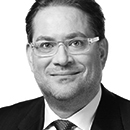
Thomas Brückner
Member of the Executive Board securPharm e.V.BPI e.V., securPharm e.V.
more ...
Thomas Brückner studied pharmacy and health economics. He gained first industrial experience Industrieerfahrung as DRA manager and monitor for clinical studies at a CRO. He was head of quality control acc. §15 AMG and information officer at a medium-sized pharmaceutical company.
Since 2003 he has been working for the German Pharmaceutical Industry Association e.V. (BPI, Berlin) and manages the office in the fields of Pharmacy, substance-based medical devices, homeopathy and anthroposophy. Besides this he is Chairman of the Board of Trustees of the SNMed Foundation SNMed and member of the executive board securPharm e.V.
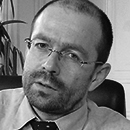
Wolfgang Straßer
CEO@YET GmbH
more ...
Wolfgang Straßer is founder and CEO of @-yet GmbH, Leichlingen and offers consulting services to international companies regarding IT security. The company @-yet GmbH focuses on IT risk management, Out & Cloud and Security Awareness.
Mr. Straßer has been working as an expert on IT risk management for multi-national companies and frequently gives lectures on data protection and IT security. Recently organized seminars addressing topics such as “Social Media and Data Integrity”, “Secured Manufacturing” and “Compliance Requirements for Energy Suppliers”.

Torsten Schmidt-Bader, Ph.D.
CEOe-QRM GmbH
more ...
Torsten Schmidt-Bader is specialized pharmacist for pharmaceutical analytics and state approved food chemist. He studied pharmacy and food chemistry at the Universities of Marburg, Düsseldorf, Münster and München and graduated from the Humboldt University of Berlin with a doctorate in pharmacy. He held managerial positions at Bayer AG, Fresenius SE, NovoNordisk S/A and Robert Bosch GmbH.
In 2008 he established his own company “moveproTEC compliance advisory” and has been working as a specialized provider of compliance support for the Life Science Industries. Consulting activities include QM upgrades acc. to GMP/GDP, quality risk management, auditing and training. As GMP&/GDP lead auditor he conducted numerous audits and certifications for SGS, amongst others in the fields of pharma logistic providers and the air freight hub Luxembourg against EU GDP guideline. He chaired the ISPE D/A/CH expert group on “PAT/QbD” from 2008 – 2014 and frequently gives lectures and holds seminars focusing on process and product safety. He has published articles in technical journals and was working recently as associate lecturer in different master programs at the Universities of Idstein and ETH Zurich.
Torsten Schmidt-Bader is also CEO of e-QRM GmbH founded in early 2015. The company focuses on customized training approaches, innovative compliance solutions (AniManuals) and 360° conferences.


